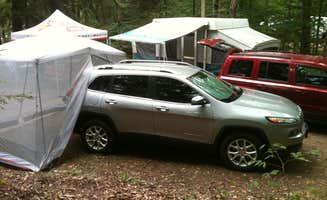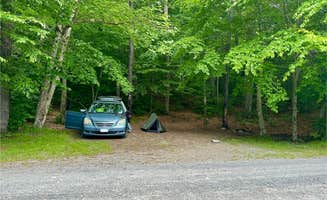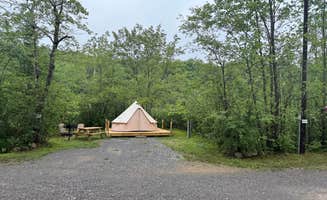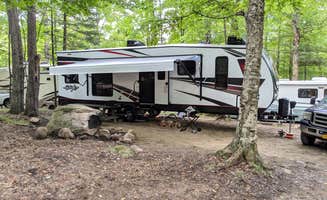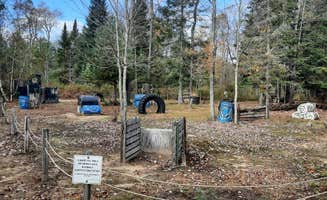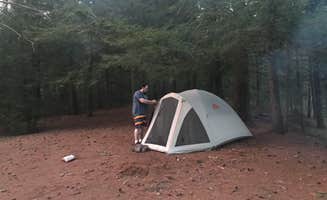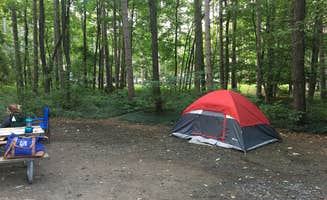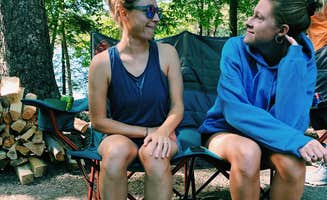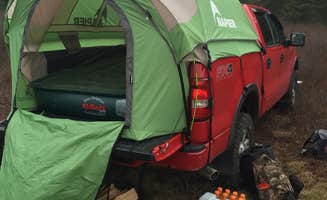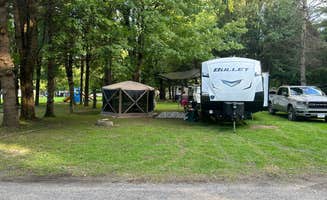Camping near Otter Lake, New York offers a mix of primitive and modern options scattered throughout the western Adirondacks. The region sits within the 6-million acre Adirondack Park at elevations ranging from 1,300 to 2,100 feet above sea level. Summer temperatures typically reach 70-80°F during the day with nighttime lows in the 50s, while black flies are common in May and June.
What to do
Kayaking on peaceful waters: North Lake Reservoir provides excellent calm-water paddling. "The only sounds came from the occasional boat across the lake and loon calls in the morning," notes Rachel P., who recommends visiting this primitive area for complete seclusion.
Bear watching (from a safe distance): Old Forge Camping Resort offers regular wildlife sightings. "Lots of black bears in area heed the warnings regarding keeping cars and camper locked keep food and cooler secure," advises Becky M. Bears frequently pass through campsites, especially during summer months.
Winter activities: Some campgrounds remain open year-round for cold-weather recreation. "Snowmobiling is the real reason to come here. Dry cabins or cottages with bath and shower are available. Snowmobile trails are accessible from the campground and seasonal rentals are available," writes Carrie H. about Old Forge Camping Resort's winter offerings.
What campers like
Private, wooded sites: Limekiln Lake Campground offers spacious, tree-covered camping spots. "Our site was spacious, with room for two cars, 4 kayaks, and two tents. The site features a picnic table (great condition) and a concrete fire pit. Behind the site is wooded forest, and the campsites on either side are far enough away to feel secluded," shares Lena L.
Island camping: Stillwater Reservoir provides boat-access sites for true seclusion. "We took a canoe to our site, it was July, warm weather, warm water and the bugs were not terrible, we were at Site 1, secluded in a cove, not a lot of traffic," explains Geoff W., who visits regularly. The reservoir offers over 40 first-come, first-served sites at no cost.
Sandy beaches: Several campgrounds feature swimming areas with natural beaches. At Stillwater Reservoir, Elizabeth B. discovered "a gorgeous waterfront to it, a stone fire circle where someone had left extra fire wood, and ample trees. The season had had unusually low water all over and it left a really unusual landscape on the beach to explore."
What you should know
Power limitations: Electrical service varies significantly between campgrounds. At HTR Adirondacks (formerly Singing Waters), one visitor reported: "We used a surge protector when plugging in to electric. It wasn't long before our power kept kicking off. We contacted the office and a staff member came and advised us that they do not have enough power for all of the campsites they have."
Wildlife precautions: Bears are common throughout the region. "We had one or two in and around our camp site almost every nite. Heed the warnings and lock car doors and don't leave coolers or grills out," advises Becky M. Most campgrounds provide bear boxes or lockers for food storage.
Limited connectivity: Cell service disappears quickly as you travel deeper into the park. At North Lake Reservoir, Tate T. notes: "Important note there is limited to no cell service here." Prepare for true disconnection at more remote sites.
Tips for camping with families
Insect preparation: Biting flies can be intense during certain seasons. "We were here in June and there was an invasion of biting flies. There were so many that you couldn't stand still for 5 seconds and it was just not enjoyable. Then we got a really good mosquito repellent (from Walmart) for skin and one for clothing and now we finally can enjoy this stay," advises Joel M. at North Lake Reservoir.
Kid-friendly activities: Delta Lake State Park offers developed facilities for families with younger children. "They have recently added electricity to the sites and a new playground at the beach. The concession stand at the beach will deliver to your camp site," notes Amy W. The park also features a large beach area with lifeguards.
Wildlife education opportunities: Many campgrounds offer chances to observe native species. At Old Forge Camping Resort, Sarah F. reports: "The deer are incredible friendly and will walk right up to you." Morning loon calls are also common across many lakes in the region.
Tips from RVers
Site selection for larger rigs: Nicks Lake Campground can accommodate sizeable RVs despite being in a wooded setting. "We have a 37ft fifth wheel & fit into our site no problem! Good cell reception & tons to do near by," mentions Bella S., who particularly recommends the beach area.
Road conditions: Access to remote campgrounds requires planning. For Kayuta Lake Campground, Michael O. notes: "The roadways can get a little tight between the trees, and can make for some interesting backing in. Also, the roadways are mostly one-way, which can make getting creative with your trailer landing position tough."
Early reservations required: Waterfront sites book quickly, especially during peak season. At Limekiln Lake, Murat H. advises: "i was careful about the reservation and picked campsite 005 on reserveAmerica website. i wanted a spot next to the water so i could land our kayaks and canoes at the campsite."


